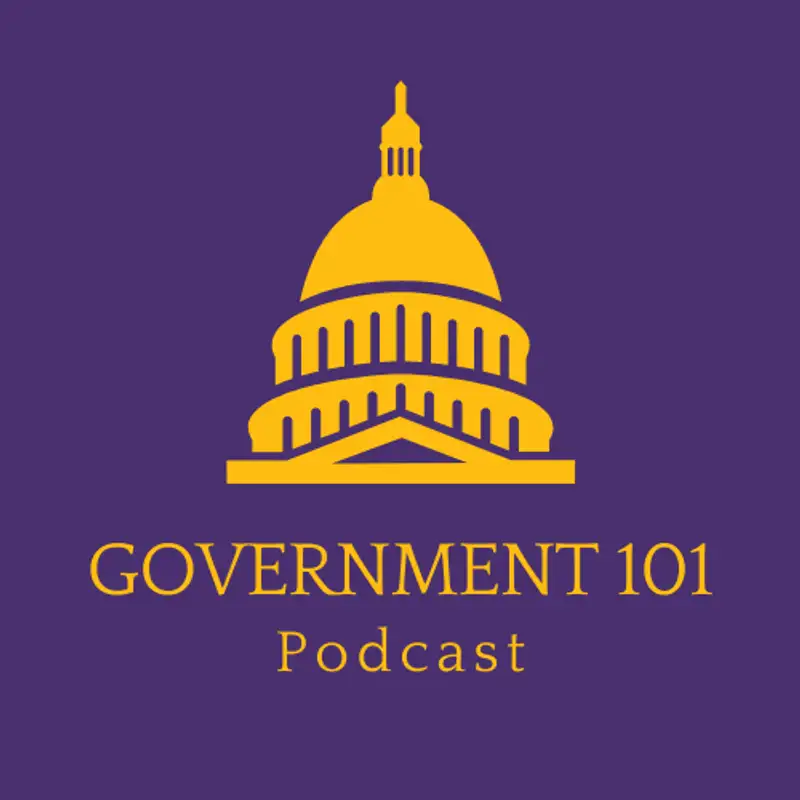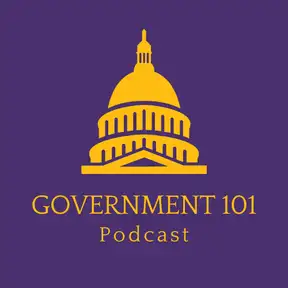Voter Registration in 2024
- Should I just?
- Yeah, go right ahead.
- OK, I thought we were going to do a countdown.
- No worries. I'll just edit all this out.
- No, leave it in. That makes it more exciting. OK.
[MUSIC PLAYING]
Hello and welcome to the Government 101 podcast. My name is Dr. Kevin Parsneau, and this is our voter registration episode. My guest today are Taylor Tambornino, Ally Werhan, and Ben Livingston. And we're going to be talking about voter registration. How about everybody introduce themselves?
- Sure. My name is Taylor Tambornino, I'm a political science student here at Mankato State University. I'm excited to be here.
- Hi, I'm Ally Werhan, I'm also a political science student, and I'm also happy to be here. [LAUGHS]
- My name is Ben Livingston. I'm studying political science and economics here at MSU, and I'm a freshman.
- I should have mentioned that I'm happy to be here.
[LAUGHTER]
OK. So I wanted to start off and just get some basic information here. What are some of the common hurdles or mistakes that people make when attempting to register to vote?
- So one thing immediately that stops a lot of people from voting is that it's very intimidating. You can feel like if you go in and make even a small mistake that you're going to be yelled at. It might be even illegal. But the people who are working the polling place are more than happy to help you with absolutely anything you may be having trouble with. Everyone wants this to run smoothly, and everyone knows it's at least a bit confusing at first. So you will get help.
- They're elderly people usually, and they're very happy to help people out, and they're excited that people are coming to vote.
- Absolutely.
- Don't be intimidated by them. OK, so second question. What are some important things people should consider while registering to vote?
- So first off, when registering to vote, you want to make sure to both have valid identification and proof that you live where you live.
- I say when election day comes by, it's also, I think, it's important to make a voting plan. Talk with your employer, talk with family, see if you can carpool possibly. Just make a plan for voting day to make sure you're able to go to the polls with ease and you're not losing out on lost wages or anything. Because Taylor will talk about later in the episode, there are laws that protect your right to go to the polls during work.
- Yeah. And when registering to vote, making sure deadlines, which we will also get to a little bit later in the deadlines when registering to vote.
- And along with your point of making sure to make a plan, it really does help to vote in a group. Not only does it make sure that as many people as you know are also voting, it also helps with registration. If you are in a group of other people that can attest that you are a resident, you don't need those forms to prove that you are a resident.
- And just as a political scientist, there is some research out there that says making voting a social event, this is cross-national, so across the world, making voting a social event increases the likelihood that people will go vote. So make it fun, make it social. It's ultimately part of your commitment to a society. So it is inherently social. So we got those basics out of the way. But now I want to talk about what you actually need to do to go vote.
- Yeah, so on voting day, if you did register before, then when you go in, you won't need any type of ID or anything like that. You'll have your name on a list. However, if you didn't register on time, it's OK. You can go in, bring a form of ID. You also will probably need something like a bill or something like that, just something that proves your home of address.
And then when you go in to vote, you'll be put in a little private booth, and they'll give you a pen or a pencil. And the ballot will say-- the ballot will tell you how to vote. It'll say choose one from this blah, blah, blah. So it'll tell you. It'll be fairly easy and understandable. If you don't, obviously you can always ask the people working there questions. They should be super friendly and helpful. They're happy to be there. They're volunteering to help you vote. So don't be afraid to ask questions.
If there is a section that you don't know any of the candidates and you have no preference, then you don't have to vote. You don't have to fill in for every section. So don't be afraid about that. If you do make a mistake, you have the right to get a new ballot. So don't be afraid. If you make a mistake, go get a new ballot. They'll be happy to give you one.
But yeah, you'll be in a private booth. You'll fill out your ballot, and then bring it back to the person who's collecting them and stuff like that. So voting day should go pretty easy, pretty smooth. It's not that difficult. And like we said, the people there are happy to help and answer questions and everything like that.
- One other thing that's just important to note in neighboring states. Minnesota does not require you to have ID as long as you have pre-registered. You do need that ID if you're registering day of. Every other neighboring state will require you to have ID, South Dakota specifically. You cannot register day of. You would have to pre-register to vote in that state.
- OK, then what are some other important deadlines for registration?
- So in Minnesota, if you're registering online or by mail, you want to make sure that that mail is postmarked by the 15th or 21 days before the election day. And online is also the deadline of the 15th. Registering online is super easy. You just go to sos.mn.gov and hit register to vote. It's very quick.
- I'll be including the bordering states. We know a lot of MSC students are from the surrounding area. So I'll just be covering the Dakotas, Iowa, and Wisconsin. So starting with South Dakota, my home state, the voter registration deadline, like as Taylor said, it is only in person. The deadline is October 21st. And the absentee voting deadline, the application must be received by 5:00 PM on November 4th.
And for the neighbor up north, North Dakota, they actually do not require voter registration. You simply need a valid ID and must have lived in the state for at least 30 days before election day. And the absentee voting deadline in North Dakota, applications must be received by November 4th.
And for Iowa, you are able to register online. And the online deadline to register is October 21st. And they also have same day voter registration. So November 5th. And the absentee voting deadline, their applications also must be received by 5:00 PM on October 21st.
And for Wisconsin, possibly the most influential and important state of the bunch, online and in person and also by mail voter registration. So for mail, your application must be postmarked by October 16, 2024. Online, the deadline is also October 16th. The in-person deadline is 5:00 PM on November 1st. You can also register same day at your polling place on November 5th, and absentee ballot requests must be received by 5:00 PM on October 31st and completed absentee ballots must be returned by 8:00 PM on November 5th.
- OK, so there's a lot of deadlines that are coming up really fast, especially by the time this podcast gets out there. If you have any questions, I think it can't hurt to check your state's secretary of state's office. They'll make this information very prominent and easy to find. Any other laws that might be important regarding states regarding voting, such as what about your workplace and whether you can vote on election day if you're scheduled to work for most of election day.
- So in Minnesota, we actually have a very lenient voting leave law. If the time you would be voting falls within your scheduled work time, you are allowed paid leave for however long it takes you to vote. The important stipulations to that are you're expected to take only the time you need to vote off of work and your employer can ask you to tell them when you plan to vote, but they cannot tell you that you can't leave to go vote. And also it would be paid time off that wouldn't dig into your vacation or sick time.
For other states, Wisconsin, you're allowed to take up to two hours of unpaid leave. In North Dakota, it's a very loose statute. Your employer is required to have a plan in place to allow you to vote, but the specifics of it aren't laid out. And then in South Dakota, you're allowed two hours to vote. So if you have two hours free during polling time, you would be expected to use your own free time. But if you don't, you are to be given two hours of paid leave. And Iowa has basically the same law, only it's three hours instead of two.
- Thank you. I have one more thing I wanted to mention. In case you're wondering what your ballot is going to look like before you go in to vote, this is a really convenient thing you can do. You can go to the website sos.state.mn/elections-voting-whats-on-myballot. Or you can just Google roughly some version of those phrases. It'll get you to the secretary of state's office. And you just punch in your address and little thing and your city, your zip code, and it'll get you essentially a list of all the candidates and issues that are on the ballot. Again, you don't have to vote in all these, as Allie said.
But if you want to do some research before you go in there, you can already know who you're going to vote for before you look at that ballot. And some people who really want to make sure they vote for exactly the right person might enjoy that option. I certainly do, because even as a political science professor, I don't always know who's running for the soil and water commission in my area. And it turns out that I do know some of these folks. So that's something you can do before you go in there. So if gets you around anything that makes you worry or think, oh, I don't want to not vote for some offices. Before we depart, is there anything else people wanted to add?
- I just want to add on to your point of looking up your ballot and seeing the candidates and the ballot measures. Researching seems like a tall task, but just a simple Google search can really get you places to be an informed voter and make the right decision. I know in South Dakota and a lot of other Western states, ballot measures are very common. And we have a record amount of ballot measures this year on the South Dakota ballot. And so stuff like that, that is direct democracy. You're voting on the issue itself. And so being able to be an informed voter, especially on the ballot measures, it's beneficial to yourself and to your communities.
- Yeah, and I think it's important to remember that you don't have to vote on every single section. So if you really don't know, you probably shouldn't be voting for a random person. So doing that little Google search before or just remembering that you don't have to vote. If you don't care about the soil and water, then you don't have to vote on that one. But voting can seem scary, but everybody's there for one purpose. And the people who are helping are there to help you. So it's not as scary as it seems. So go vote.
- And like you said, a lot those local races, they are your neighbors. They are your friends. And I have family and friends are in the state legislature in South Dakota. It's all levels. All the way down to the school board and especially those local races, those really affect your everyday life.
- Absolutely. And then I know you've heard it 1,000, maybe a million times before, but go vote. If you are a citizen of the United States, it is both your civic duty, but also one of your rights. It's important that you have a voice in what is going on around you, and this is how you do it.
- OK, I think that wraps it up. I hope everyone found this helpful. I'd like to thank our guests, Taylor Tambornino, Ally Werhan, and Ben Livingston, for joining me today. I'm Dr. Kevin Parsneau, and I've been the host. The Government 101 podcast is a production of the political science program and the politics and policy student organization at Minnesota State University, Mankato.
Any views expressed here are solely those of the podcast participants and do not necessarily represent the views of the Minnesota State, Mankato, or any affiliated parties. Thank you for joining us on the podcast, Government 101. Have a wonderful day.
Creators and Guests


